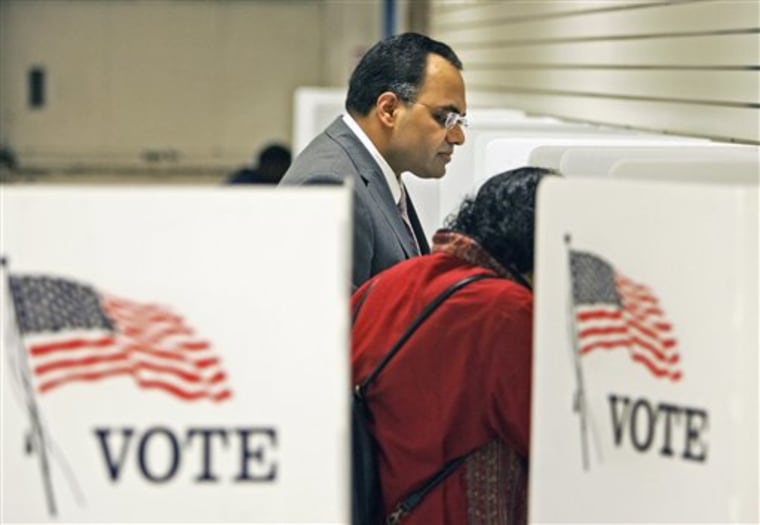Five weeks before the election, Ohioans started casting their ballots Tuesday in the perennial battleground that tipped the election to President Bush four years ago and may determine his successor.
Republican John McCain and Democrat Barack Obama are focusing intently on Ohio as they seek to pile up state-by-state victories to reach the 270 Electoral College votes needed to win the White House.
Both visit often while spending millions of dollars flooding TV and radio with advertisements, mailboxes with literature and even voicemail with automated phone calls to get supporters to the polls, particularly during the one-week window that began Tuesday in which people can register and vote in one swoop.
Early participation appeared light.
"I wanted to avoid the traffic and the people," said Charlene Glass, 49, of Cleveland Heights, as she voted for Obama at the Cuyahoga County Board of Elections, where about 230 people had voted by midday. At one site in Toledo, 15 people were waiting before the doors opened and about 200 had passed through in four hours. Abdulla Abdi, age 24 and an Ohio State University student, cited convenience in casting his vote early for Obama in Columbus, saying: "I don't want to have to come back when I'm having exams.
At stake: 20 electoral votes — perhaps, the presidency itself.
Most recent state polls show a dead heat; others give McCain a slight edge. National surveys show Obama ahead. The disparity underscores the difficulty Obama is having in closing the deal in this pivotal state. He's a first-term senator from Chicago with a liberal voting record and would be the country's first black president.
Ohio is crucial to McCain's electoral strategy. Bush won Ohio, and a loss for McCain here would be very difficult to make up with victories elsewhere given that the political landscape favors Democrats and several other key states are tilting toward Obama.
Obama, however, now leads McCain in enough other states Bush won in 2004 that he could lose Ohio and still reach the 18 electoral votes he would need if he carries all the states Democrat John Kerry did in 2004. Still, winning Ohio itself could do the trick.
Every factor is at play in Ohio.
Among them: Can Republican McCain overcome his links to the deeply unpopular Bush and a weakened state party and prevail in a state that suffered large losses of manufacturing jobs and large numbers of Iraq war deaths? Can Democrat Obama overcome voter concerns about his voting record and race among the many blue-collar workers in this culturally conservative, deeply divided state?
Obama got shellacked here by Hillary Rodham Clinton in the Democratic primary: She carried 83 of 88 counties as white working class voters flocked to her economic populist message. Thus, Obama is copying Gov. Ted Strickland and Sen. Sherrod Brown, Democrats who went into Republican areas and boosted turnout to narrow GOP margins.
"Democrats too often have forgotten about places like this," said former Mississippi Gov. Ray Mabus, an Obama supporter who recently met with some two dozen rural voters in London in western Ohio. "They have forgotten about small-town America, rural America, agricultural America and taken it for granted that we're going to vote the other way."
Linda Ward, a nurse from western Ohio, has tried to persuade others to take a critical look at McCain but hasn't had much luck. "Not my neighbors, not my friends. This area is a very conservative one," she said.
Diane Ferguson, a nursing home director in southeast Ohio, says she likes Obama but isn't sure she can vote for him. She's troubled by his early resistance to wearing a flag pin, his race, and a resume that looks thin to her.
"It's a hard decision," she said. "I don't know if we're ready for that one."
Aware of such skepticism, Obama's campaign is using its financial and organizational muscle to boost turnout among his core supporters — blacks and the youth. His campaign long planned for this early voting period and organized car pools from college campuses to early voting sites across the state.
Independent groups seeking to increase poor and minority participation also transported voters from places like homeless shelters, halfway houses and soup kitchens.
"We've had mediocre response," Matt Stone, an organizer of the group Vote from Home, said at the Franklin County Veterans Memorial in Columbus, where voting was but a trickle. "We hope the effort will snowball over seven days as people talk about it."
Outside the voting site, Republican lawyers apparently concerned about voter fraud snapped photographs of vehicle license plates.
On Monday, the state Supreme Court and two federal judges upheld the ruling by Democratic Secretary of State Jennifer Brunner that allows new voters to register and cast an absentee ballot on the same day from Tuesday through Oct. 6. Republicans argued that Ohio law requires voters to be registered for 30 days before they cast an absentee ballot.
The Ohio GOP asked the 6th U.S. Circuit Court of Appeals in Cincinnati on Tuesday either to stop same-day voting or require elections official to separate those ballots so the registrations can be verified. But Brunner already has instructed election officials to segregate those ballots and verify the registrations before counting them.
